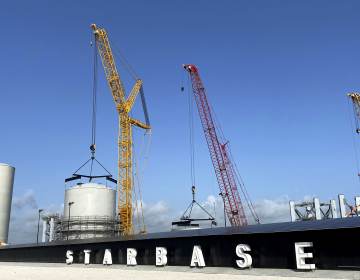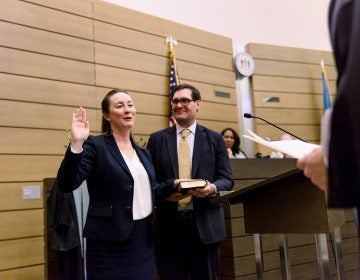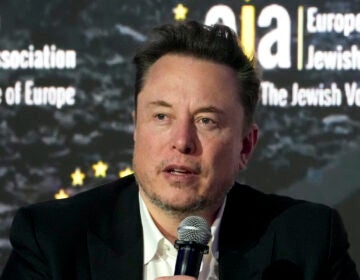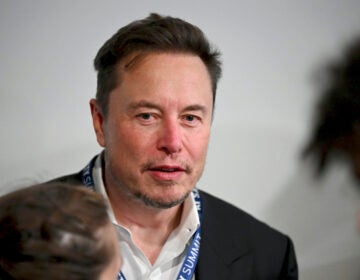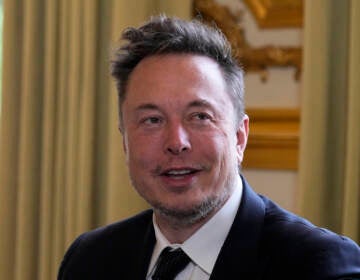Elon Musk takes the stage in Wilmington courtroom and doesn’t hold back
Musk testified in a Tesla shareholder lawsuit against him. He's the latest business celebrity to appear in Delaware Chancery Court.
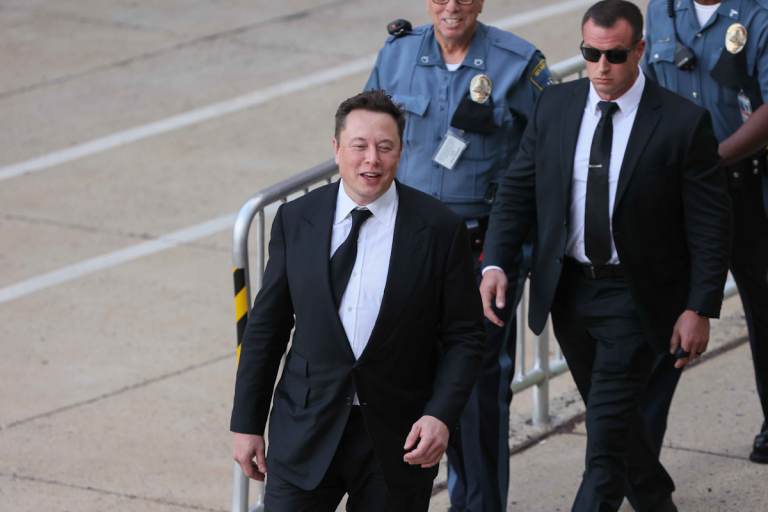
Tesla founder Elon Musk leaves the New Castle County Courthouse on Monday, July 12, 2021, in Wilmington, Delaware. (Saquan Stimpson/WHYY)
The business magnate was calm and composed in court Monday, even when calling his legal antagonist “a bad human being.”
The man on the witness stand was Elon Musk. He’s the entrepreneur and visionary who co-founded the Tesla electric car company and the SpaceX exploration enterprise, among other ventures, including the one that became PayPal.
Musk is also one of the world’s wealthiest humans, prone to loquaciousness and confrontation. All eyes were on the South African-born entrepreneur when he appeared Monday in Delaware Chancery Court before more than 50 lawyers and reporters, and a few fans.
For three hours in the morning session, Musk described his path (through the University of Pennsylvania) to becoming a billionaire and defended himself against accusations of self-dealing in a lawsuit brought by some Tesla shareholders.
Musk is the latest of a handful of high-profile executives and celebrities who have traveled to Delaware to testify in this unique court that resolves equity disputes involving companies incorporated there. Other business luminaries to appear include T. Boone Pickens, Carly Fiorina, Sidney Poitier, Michael Eisner, and Roy Disney. On Monday, a sketch artist was in court, where cameras are not permitted, to capture images of Musk for Reuters, CBS, and NBC.
Musk entered the New Castle County Courthouse via a non-public entrance more than an hour before the start of Monday’s 9:15 a.m. session, avoiding a phalanx of news cameras lined up in front of the building.
During the morning session, Musk, wearing a black suit, white shirt, and black tie, entered through a side door — not through the courtroom doors used by other witnesses.
Musk’s testimony could continue into Tuesday, said Randy Baron, the shareholders’ attorney. Baron was the subject of Musk’s disdain Monday and during a June 2019 deposition in the case that was delayed because of the coronavirus pandemic. In-person trials didn’t resume until last month.
‘Do you believe him?’ opposing attorney asks about Musk
The lawsuit centers on whether Musk exerted undue influence on the Tesla board when it bought solar power company SolarCity for $2.6 billion in 2016. Musk is CEO of Tesla and was board chairman at SolarCity.
Tesla board members settled their part of the case in late 2020 for $60 million but Musk decided to go to trial.
“Do you believe him?” Baron asked during a break in the morning testimony.
That question is for Vice Chancellor Joseph R. Slights III to decide – there are no juries in Chancery Court.
Slights must rule whether Musk acted to benefit himself, his family, and other companies, as the plaintiffs claim, or for the shareholders, as he asserted time and time again Monday.
Chancellors traditionally rule in writing weeks after trials end.
Musk began by providing a brief biography under gentle questioning by his attorney, Evan Chesler.
His journey took him from Pretoria to Canada at the age of 17, where he worked on a cousins’ farm in Saskatchewan, and later at a lumber mill in Vancouver. After a year at Queen’s University in Ontario, he said he won a scholarship that enabled him to attend Penn.
Saying he was interested in “science fiction and philosophy and the nature of the world” when he arrived in Philadelphia, he decided five factors would most affect the “future of humanity.”
They were “the internet, the transition to a sustainable energy economy, artificial intelligence, making life multiplanetary, and human genetics.”
At Penn, he earned degrees in physics and economics, then set out for Stanford University in California with an interest in the “potential in electrical vehicles.”
“I was offered some well-paying jobs on Wall Street,’’ Musk testified, but he turned them down “because technology is my primary interest.”
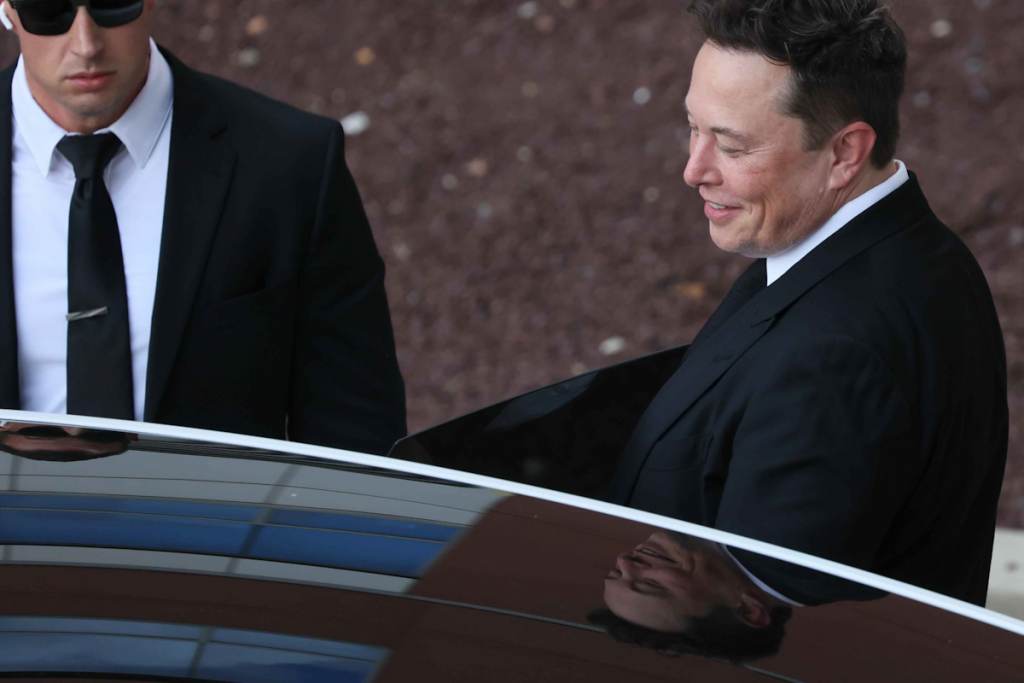
At Stanford he had an internship with a company doing research in rocket science, and worked on a mapping software project, then left school to go into business, he said. He and his brother founded Zip2, which provided an online city guide software to the New York Times and Knight Ridder newspapers. That company was sold for $300 million, leading to another venture that evolved into the PayPal online payment company.
He went into the finance arena because “I wanted to be responsible for a few breaks in the edifice of the internet,’’ which in the late 1990s was “only dial-up,” Musk testified.
“If you were eBay and wanted to sell something you had to send a check and wait for it to clear. And this could be two full weeks. I said, ‘We could make this instant.’”
When eBay bought PayPal in 2002, Musk made a reported $180 million in the deal.
His interest in electric cars led him to Tesla Motors, as well as creating a sustainable solar generating system for the vehicles and homes.
In a master plan for Tesla he wrote in 2006, when he was already running SpaceX, Musk said he was putting his money into the car company “to help expedite the move from a mine-and-burn hydrocarbon economy towards a solar electric economy, which I believe to be the primary, but not exclusive, sustainable solution.”
SolarCity was part of that equation, Musk said, adding that it “would be generating the electricity in a sustainable manner.”
Musk owned about 20% of the stock in Tesla and SolarCity when the two merged in 2016, he testified. He insisted it was a good deal for both companies, and that he did not vote on the deal or take part in the negotiations, and the Tesla board agreed.
“They work hard and they are competent and they are rigorous, acting on behalf of shareholders,” he testified.
“I said ‘the time is now to create an integrated solar battery product,’’’ he testified.
After the merger, the work on the Tesla Model 3 was having difficulty, as both companies struggled, and Musk said he redeployed all employees at Tesla to work on that project to keep the company solvent.
“Tesla was in really dire straits, headed for bankruptcy at high speed,’’ he said, describing the three-year period that ended in 2019 as “the hardest years in my life.”
Musk concluded his direct testimony by noting that despite the pandemic, the market cap of Tesla, has exploded from about $40 billion at the time SolarCity was acquired, to “like $600 billion today.”
Musk calls plaintiffs attorney ‘a bad human being’
The mood changed immediately after Baron replaced Chesler at the podium. Baron gave no deference to Musk and the magnate gave none back, though he remained subdued while being combative.
Baron first played clips from his deposition of Musk two years ago.
“You were attacking the premise of their lawsuit,’’ Baron said of the case brought by his clients.
In one clip, Musk suggested that “you stop wasting everyone’s time” and give his plan time to work out for both Tesla and SolarCity.
He also said that over time, even the idea of suing him would look “silly.”
On Monday, Musk and Baron continued quibbling over details about what Musk said in the past, his control over the companies, and what Baron suggested was his propensity to denigrate anyone with the temerity to question him. When Musk tried to elaborate, Baron tried to limit him to a yes or no answer, often turning to Slights for help with the witness.
“Is solar fixed?” Baron asked.
“I think it’s fixed and the trend is very positive,’’ Musk replied.
Baron countered that SolarCity is still having productivity and other issues and then the two sparred about the impact of the pandemic.
When Baron put up a chart that said dozens of executives had fled Tesla in recent years, Musk responded, “They have not fled.”
“Dozens have left the company,’’ Baron said.
Musk replied that in a company with 90,000 employees and some 5,000 “directors,’’ it’s not uncommon for many to leave. “We have better executive retention than average,’’ he said.
Baron also attempted to show Musk’s antipathy to hard questions by turning again to the taped deposition from 2019.
Musk, with his hands folded and looking agitated, looked squarely at his inquisitor and said, “I think you should reconsider your life.”
On the tape and on the stand Monday, Musk called Baron a bully and said officials at previous law firms he had worked for had been convicted criminally for putting bogus witnesses on the stand.
“You were mentored by criminals and continued to be mentored by criminals,’’ Musk said. “I think you are a bad human being.”
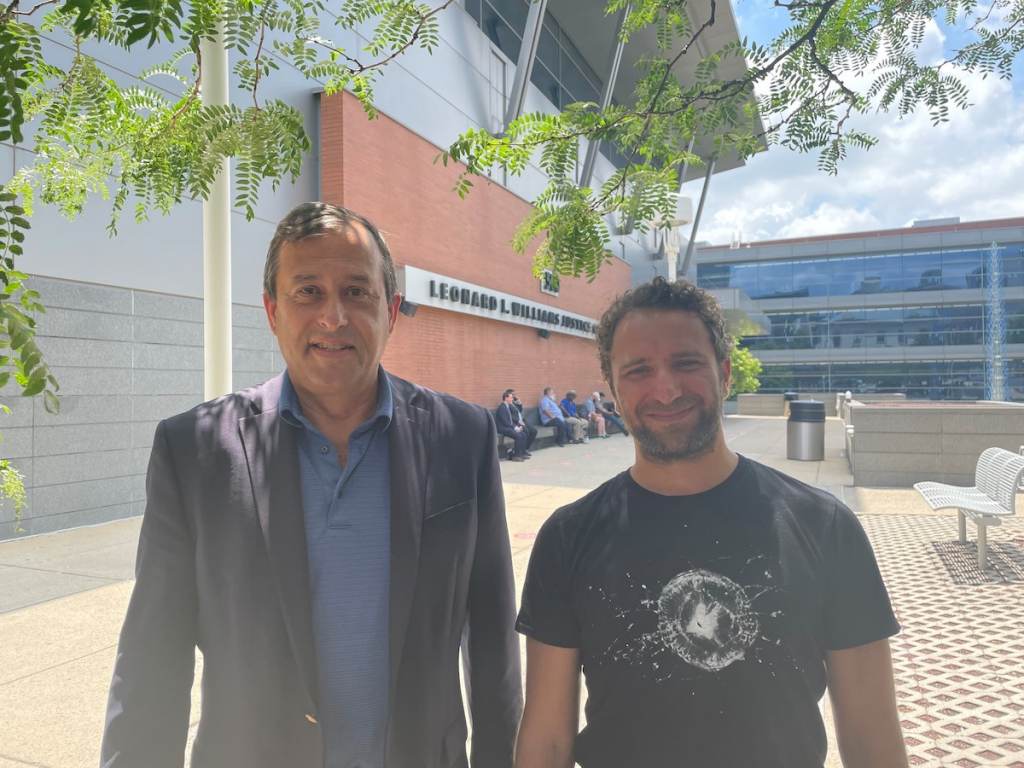
In the audience, observing the contentious exchanges with keen interest, were two serious Musk devotees — Wilmington web developer Kiril Cvetkov, and retired federal customs agent Karl Golovin of Alexandria, Va.
Cvetkov, who drives a $50,000 Tesla Model 3, said he “just wanted to get a glimpse of Elon Musk in person. He’s a very busy man and he’s not going to have that much public appearances.”
Cvetkov added that “I believe in the goal of his companies and his purpose. And so I would love to support him in any way I can.”
As for the testimony, Cvetkov clearly supports his tech idol.
“I feel he really is wasting his time,’’ Cvetkov said of Baron and the lawsuit in general. “I don’t see any grounds for this claim.”
Golovin, who has put in an order for the Tesla Cybertruck, agreed, saying that from what he heard, the plaintiffs have a “very weak case.”
Golovin said Baron was just trying to “nitpick over Elon’s comments or statements he made during the deposition” or in interviews.
Added Cvetkov: “He’s trying to push him to say things that he wouldn’t normally say by twisting the words and putting the questions in a certain way. It is bullying.”

Get daily updates from WHYY News!
WHYY is your source for fact-based, in-depth journalism and information. As a nonprofit organization, we rely on financial support from readers like you. Please give today.


